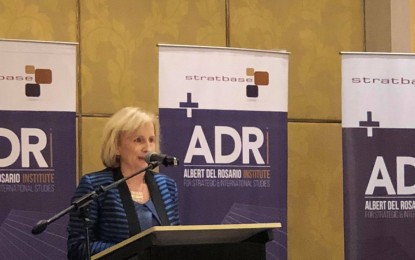
Australian Ambassador Amanda Gorely speaks at the forum organized by Stratbase ADR Institute in Taguig City. (Photo courtesy of British Embassy in Manila)
MANILA-- The Australian government on Friday called on the Association of Southeast Asian Nations (ASEAN) and China to negotiate the Code of Conduct in the South China Sea (COC) without prejudice to the rights and interests of third-party states in the strategic waters.
"We urge parties to ensure the Code of Conduct is consistent with existing international rules, including those in UNCLOS (United Nations on the Law of the Sea). The Code of Conduct should not prejudice the interests of third parties or the rights of all states under international law, including UNCLOS," Australian Ambassador Amanda Gorely said in a forum on the rules-based international system.
The forum was organized by the Stratbase ADR Institute in Taguig City.
As a member of the Indo-Pacific region and ASEAN’s oldest dialogue partner, Gorely said developments in the South China Sea matter to Australia.
Gorely believes the COC negotiation has the potential to help manage the disputes and deescalate tensions.
She said the document must reinforce existing regional architecture, the ASEAN’s centrality, and "it should strengthen parties’ commitments to cease actions that would complicate or escalate disputes, particularly militarization," among others.
Reports, citing a draft document between China and the 10 ASEAN member-states, said Beijing suggests to conduct regular joint military exercises in the South China Sea, excluding countries outside the region "unless the parties concerned are notified beforehand and express no objection."
Gorely said any document that deprives non-signatory states their rights under the international law would be a cause of concern.
"I'm reluctant to comment on a document I haven't seen but in terms of general principle, I think any document that impacts on the current rights of states under international law to exercise freedom of navigation to work with partners in the region, (on) military exercises, etc. would be a cause of concern for Australia," she said.
With countries outside the region such as the United States and India who have different interpretations of military activities within an exclusive economic zone, an expert said this would explain why China seeks to pursue the proposal.
"I haven't seen any excerpts of the draft COC. I think we need to bear in mind though that China and other countries like the US and India as well have different interpretations of military activities within the EEZ," Alexander Neill, Shangri-La Dialogue Senior Fellow from the International Institute for Strategic Studies in Singapore, said.
"I think that would explain why China is adamant that, in any Code of Conduct, military activities within EEZ is curtailed or at least any activity is at the behest of China particularly where territorial claims are concerned," he added.
China, Taiwan and some ASEAN member-states including the Philippines, Malaysia, Brunei, and Vietnam, have rival claims in the South China Sea.
For more than a decade, China and ASEAN committed to working towards the early adoption of the COC but it was only during the 20th ASEAN-China Summit in the Philippines in November last year that development on the document began to move forward.
To date, Beijing and ASEAN states are holding series of negotiations to finish a mutually agreed COC. (PNA)
